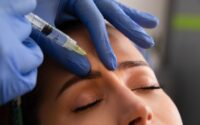‘Beer goggles’ no longer an honest excuse for your drunken hookup: new research
You can’t blame it on the alcohol anymore.
We’ve all been there — eyeing the stranger across the bar who looks a little too good after downing a few brews. Sober, they’d never be your type. But after one too many, maybe…
The phenomenon — when someone appears much more attractive to a person who’s drunk — has been chalked up as “beer googles.”
But researchers believe they’ve debunked the age-old excuse.
The study, published Wednesday in the Journal of Studies on Alcohol and Drugs, enlisted 18 pairs of men to test the prevalence of the alcohol-induced mirage, but found that the male participants did not waver from how attractive they found other people.
“Conventional wisdom would suggest that alcohol leads people to perceive others as more physically attractive,” study author and Stanford University professor Dr. Molly Bowdring told The Post.
Bowdring and her doctoral advisor, study co-author Dr. Michael Sayette of the University of Pittsburgh, believed their findings would build upon pre-existing research suggesting the “significant effects” of beer goggles, but were surprised to see how negligent alcohol affected attractiveness perception.

The researchers did, however, find that the spiked elixirs gave boozers some extra confidence.
“To our knowledge, this is the first study to look at whether people choose to interact with more attractive people after drinking,” said Bowdring, who is interested in why people enjoy drinking and why, for some, it can be problematic.
The study participants, who consumed about three standard drinks in just over 30 minutes for the study, were more likely to interact with people they found attractive while under the influence.

The findings provide “some support for this notion of liquid courage,” added Bowdring.
Gender and age played a vital role in the study, which enlisted male volunteers in their 20s.
While age can affect attraction between people, Bowdring said, it is easier to analyze the effects of alcohol on men.

“Prior work has shown that alcohol-related social rewards are strongest for male drinkers, which means there’s a greater likelihood to observe alcohols effects among this group,” Bowdring explained.
In the study, the participants were asked to rate the attractiveness of people, who matched their ages, in photos and videos while sober and intoxicated.
While past experiments have stopped there, the most recent report included an additional element: the possibility of meeting in-person.
“Most experimental tests of alcohols effects have relied on testing people in isolation,” Bowdring said, meaning participants drink alone and may not reveal the many ways alcohol can affect social interaction and perception.
“Because physical attractiveness plays a pretty key role in our social experiences, we wanted to better understand how does alcohol influence that.”
When offered the prospect of interacting with attractive strangers in the future, the men were 1.71 times more likely to want to meet one of the most attractive people while drinking, which they might not otherwise dare to do sober.
In other words, the booze isn’t clouding your vision, it’s just boosting your rizz (or charisma, for those not on TikTok).

But alcohol-inhibited social interactions could be blissful in the moment, drinkers may be left with a nasty case of hang-xiety — the dreaded concoction of both a hangover and regret the morning after.
Alcohol can “alter our social motivations,” said Bowdring.
While rewarding in the short-term by way of bonding, social connectedness and a good time, drinking could also have “harmful” consequences, such as “saying something you regret the next day” or even “engaging in risky sex.”
She urged readers to reflect on “whether or not it’s worth it for you to consume alcohol.”


